September 20, 2018
Edited by David Sanders
Specimen Days
1790—Francisco Acuna the Figueroa, Uruguayan poet (Toraidas), is born.
1890—Rachel Bluwstein, Hebrew poet, born in Saratov, Imperial Russia (d. 1931).
1902—Stevie [Florence Margaret] Smith, English poet and novelist (Not Waving but Drowning), born in Kingston upon Hull, England.
1923—Geraldine Clinton Little, Irish-born poet (d. 1997), is born.
1928—Donald Hall, American writer, literary critic and Poet Laureate of the United States, born in Hamden, Connecticut (d. 2018), is born.
1975—Saint-John Perse, French diplomat/poet (Nobel 1960), dies at 78.
2015—Charles Kenneth "C K" Williams, American poet and translator (Pulitzer prize 2000), dies at 78.
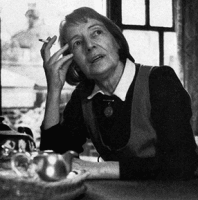
In My Dreams
In my dreams I am always saying goodbye and riding away,
Whither and why I know not nor do I care.
And the parting is sweet and the parting over is sweeter,
And sweetest of all is the night and the rushing air.
In my dreams they are always waving their hands and saying goodbye,
And they give me the stirrup cup and I smile as I drink,
I am glad the journey is set, I am glad I am going,
I am glad, I am glad, that my friends don't know what I think.
—Stevie Smith
“In my dreams I am always saying goodbye and riding away” – Stevie Smith
World Poetry
Russian Soccer Players Embroiled in Instagram Poem Dispute
Two Russian soccer players have become embroiled in a dispute over a poem on Instagram. Spartak Moscow captain Denis Glushakov and defender Andrei Yeshchenko have been accused of pressing the "like" button on an Instagram post by Russian actor Dmitry Nazarov mocking Spartak coach Massimo Carrera.
Recent Reviews
‘Essential Essays’ Show Adrienne Rich’s Vulnerable, Conflicted Sides
by Parul Sehgal
“What does a woman need to know?” In 1979, Adrienne Rich delivered one of history’s spicier commencement speeches, at Smith College, opening with this question. Her answer: How could you possibly decide? Four years at Smith won’t have helped you. “There is no women’s college today which is providing young women with the education they need for survival.” Colleges exist to groom women to conform as best they can to institutions rigged against them, to subsist on fantasies of exceptionalism, she said. Colleges exist to produce tokens. Congratulations, graduates.
What Justice Is and Is Not: On Lauren Levin’s ‘Justice Piece // Transmission’
by Arya Samuelson
“What is justice?” This is the inquiry around which Lauren Levin’s Justice Piece // Transmission orbits. Unflinching, dialectical, and curious to its core, Levin’s work grapples with the nature and practice of justice—what it is, what it isn’t, who defines and enforces it, how we learn or create it, and how its absolutes buckle under the weight of examination. Consisting of two prose poems, “Justice Piece” and “Transmission,” Levin’s explorations raise even more questions—about motherhood, illness, family, and whiteness—which form a tangled, poetic body of limbs, placental membranes, and beating hearts.
“What does a woman need to know?” Adrienne Rich opened her commencement at Smith College with this question.
Broadsides
Democracy and the Cultural Ideal
by Robert Pinsky
The 2016 presidential election made me more aware of two demographic groups. One is made up of young American males, mostly white and not college educated. They wavered, surprisingly, between two candidates — Donald Trump and Bernie Sanders. The second category of young people, much larger and made up of various races, genders, and ethnicities, was resolutely not interested in voting. I know what choices I would like from these young citizens. But what would I like our country to give them?
On the Third Most Popular Poet of All Time
by Philip Metres

The first thing that you learn about Khalil Gibran from an Arab, particularly a Lebanese immigrant in love with the Old Country, is that his name is not Khalil Gibran. Nor is it, as my edition of The Prophet has it, “Kahlil Gibran.” He was born Gibrān Khalīl Gibrān bin Mikhā’īl bin Sa’ad. It’s typical for an immigrant to the New World to shed some of the flourishes of an Old World name, so its Ellis Island-style reduction is not so surprising. However, the spelling of his first name still mystifies me; in Arabic, the sound that we transliterate as “kh” is an aspirated “h” so the displacement of the “h”—which appears not only on his books, but also on his letterhead—is but one of many “lost in translation” moments of the boy from Bsharri.
How Chaucer Weaves High-minded Poetry with Low Comedy
The Canterbury Tales manage to combine the most solemn chivalric concerns and bright lyric poetry with bawdy gags about bums and red hot pokers
by Sam Jordison
The thing that most people know about The Canterbury Tales is that it’s full of good old-fashioned filth. The storytellers may be on a religious pilgrimage, but they’re just as interested in matters earthy as they are celestial things. For every religious reference, there’s a bum joke; scatology always follows eschatology.
Philip Metres reflects on the third most popular poet of all time… Khalil Gibran.
Drafts & Fragments
Bicycling Poet Hand-Delivers Dreams — And Nightmares — To Chicago Customers For $45 A Month

Mathias Svalina writes dream-like poems during the day and delivers his printed stream of consciousness narratives by bike in the wee hours of the night to subscribers, always aiming to finish by sunrise. A 43-year-old author of five books of poetry, Svalina is the creator of Dream Delivery Service, which he started in Denver in 2014. Since then, he’s traveled around the country to different cities, delivering poems by bike. He prefers to calls his surrealist poems “dreams.”
A bicycling poet named Mathias Svalina is hand-delivering dreams for $45 a month.
Poetry In the News
Americans Are Reading More Poetry, Less Fiction
According to a study published Wednesday by the National Endowment for the Arts, poetry reading is on the rise while Americans’ interest in fiction has fallen. The report, called U.S. Trends in Arts Attendance and Literary Reading: 2002-2017, found the percentage of adults reading fiction dropped from 45.2 percent in 2012 to 41.8 percent last year, while poetry reading increased from 6.7 percent to 11.7 percent.
Google's Trafalgar Square Lion Uses AI to Generate Crowdsourced Poem

In London's Trafalgar Square, four lions sit at the base of Nelson's Column. But starting today, there will be a fifth. Google Arts & Culture and designer Es Devlin have created a public sculpture for the London Design Festival. It's a lion that over the course of the festival will generate a collective poem by using input from the public and artificial intelligence.
Google invented a lion sculpture that will generate a collective poem using public input and artifical intelligence.
New Books
Refuse: Poems by Julian Randall
[Paperback]University of Pittsburgh Press, 80 pp., $17.00
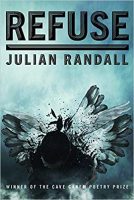
Set against the backdrop of the Obama presidency, Julian Randall's Refusedocuments a young biracial man's journey through the mythos of Blackness, Latinidad, family, sexuality and a hostile American landscape. Mapping the relationship between father and son caught in a lineage of grief and inherited Black trauma, Randall conjures reflections from mythical figures such as Icarus, Narcissus and the absent Frank Ocean. Not merely a story of the wound but the salve, Refuse is a poetry debut that accepts that every song must end before walking confidently into the next music.
Cease by Beth Bachmann
[Paperback] University of Pittsburgh Press, 72 pp., $17.00
Cease begins with the words, “to keep the peace/we need a wall/to fall to our knees before….” Framed by the long poem, “wall,” Beth Bachmann’s new collection of poetry wildly upturns the boundaries between bodies at peace and bodies at war, between the human territory of border walls and the effects of war on the environment and landscape, between the movements of soldiers and of refugees, between terror as an interior state and violences performed on the body, and between the words of politicians and the breath of a poem. Taking up Muriel Rukeyser’s call for women poets to respond to war, “Women and poets see the truth arrive,” the poems in Cease are almost breathless in their speed and presence on the page. Cease is both a plea and an awakening to peace as a process and a transient state.
Like: Poems by A. E. Stallings
[Hardcover] Farrar, Straus and Giroux, 160 pp., $24.00
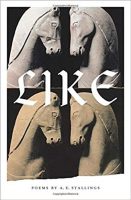
Like, that currency of social media, is a little word with infinite potential; it can be nearly any part of speech. Without it, there is no simile, that engine of the lyric poem, the lyre’s note in the epic. A poem can hardly exist otherwise. In this new collection, her most ambitious to date, A. E. Stallings continues her archeology of the domestic, her odyssey through myth and motherhood in received and invented forms, from sonnets to syllabics. Stallings also eschews the poetry volume’s conventional sections for the arbitrary order of the alphabet. Contemporary Athens itself, a place never dull during the economic and migration crises of recent years, shakes off the dust of history and emerges as a vibrant character. Known for her wry and musical lyric poems, Stallings here explores her themes in greater depth, including the bravura performance Lost and Found, a meditation in ottava rima on a parent’s sublunary dance with daily-ness and time, set in the moon’s Valley of Lost Things.
Time’s Language: Selected Poems (1959-2018) by Margaret Randall
[Hardcover] Wings Press, 448 pp., $24.95
Time's Language contains powerful poems of witness as well as personal poems, and autobiographical prose pieces (that read like prose poems), recounting a life of resistance, the life of a life-long literary and political revolutionary. As US Poet Laureate Juan Felipe Herrera writes, "Here are Margaret Randall’s decades of love, ink, tears, contestation and light—let us bow in gratitude for this truth-telling, daring, border-breaking, pioneering long-time volume of soul fire."
Throwing the Crown by Jacob Saenz
[Hardcover] American Poetry Review, 80 pp., $23.00
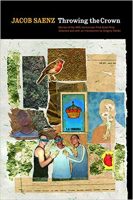
Winner of the prestigious Honickman First Book Award from the American Poetry Review, selected by Pulitzer Prize winner Gregory Pardlo, Throwing the Crown describes a boyhood on the edge. Set in a Chicago neighborhood dominated by gang life, Saenz sets the sweetness and vulnerability of youth against the cold reality of a gun pressed against a forehead. Full of accelerative sound―tight rhymes and short, percussive lines―these poems follow a fast-paced trajectory from danger to survival, pausing to acknowledge the beauty and humor in the details along the way.
Throwing the Crown describes a boyhood on the edge.
Correspondences
Sherwin Bitsui On Poetry as Translation and the Influence of Nature
by Parrish Turner

Sherwin Bitsui’s next poetry collection, Dissolve, comes out in October 2018. His recent work leans long, providing him the space to explore his ideas. He writes about the tension between nature and the world humans inhabit, always keeping in focus the continuous movement between states of being. Bitsui sits down with Culture Trip to discuss his poetry and the power of language.
A Conversation with Chus Pato
by Michael Kelleher
Chus Pato is one of the most significant poets writing in Galician today. Thanks to the efforts of her translator, Canadian poet Erín Moure, five volumes of her work have been translated into English, the two most recent being Secession/Insecession (BookThug, 2014) and Flesh of Leviathan (Omindawn, 2016). It was almost by chance that I encountered her work. I met Erín in the fall of 2017, and she handed me three of the books she’d translated. It took all of one line from the first poem in m-Talá(Shearsman/Buschekbooks, 2009) to make me realize I was in the presence of a major poet and thinker.
Poet Emily Jungmin Yoon Talks Writing her New Book and Using Poetry to Keep Forgotten History Alive
by Tara Betts
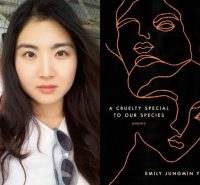
Emily Jungmin Yoon is a Korean Canadian poet who wrestles with history. Her debut full-length poetry collection, A Cruelty Special to Our Species, is available on September 18th and explores the history of Korean “comfort women” during World War II. Through different perspectives and voices, Yoon documents the painful—and often silenced—stories of comfort women, or the “women who were forced into sexual labor” by Japanese soldiers occupying Korea.
A Pained Intuition and a Palpable Longing: Katie Ford on Theology, Poetry, and the Unknowable
by Nick Ripatrazone
If You Have to Go, the new collection of poems by Katie Ford, is a book that conjures powers of possession. I feel that way about all of her books: Her poems bring me to a mystical plane somewhere between language and life. I’m left shaken. Her willingness—we might even call it her essence—to write seeking the untellable makes her work unique.
Emily Jungmin Yoon is a Korean Canadian poet who wrestles with history.
Envoi: Editor’s Notes
Lessons from the Past: Stevie Smith
“All poetry has to do is to make a strong communication. All the poet has to do is listen. The poet is not an important fellow. There will always be another poet.”
The poet is not an important fellow. There will always be another poet.” – Stevie Smith